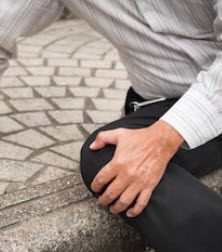Sudden and unexpected slip-and-fall incidents often cause extremely serious injuries. Each year, over eight million people visit hospital emergency rooms after a slip-and-fall. That’s far more visits than any other kind of unintentional injury, like car crashes.
Slip-and-falls are especially serious for people over 65. Unfortunately, this age group is the largest one for slip-and-fall injuries. A majority of older victims never fully recover and can no longer live independently.
Because of the serious nature of these injuries, an attorney may be able to obtain substantial compensation. These benefits usually include money for economic damages, such as medical bills, and noneconomic damages, such as pain and suffering. Generally, the legal claims process involves three steps, which are outlined below.
Legal Duty
All negligence claims begin with this question. An early negligence case compared legal duty with the Golden Rule (Do unto others as you would have them do unto you). In premises liability cases, like dog bites, slip-and-falls, and swimming pool drownings, there are basically three types of legal duty:
- Reasonable Care: This duty applies if the victim was an invitee. Invitees have specific permission to be on the land and their presence benefits the owner. In this context, the duty of reasonable care involves more than a responsibility to keep the premises safe. Landowners must also inspect their properties to help ensure their safety.
- Duty to Warn: Guests of apartment tenants, and other similar individuals, are licensees. These people have express or implied permission to be on the premises, but their presence creates no actual or potential benefit. The duty to warn usually involves latent defects, like loose stairway rails.
- No Duty: A few victims are trespassers (No permission and no benefit). Generally, landowners owe no legal duty in these cases. The stories about injured burglars who sue distraught homeowners are basically urban legends.
There are some exceptions to the trespasser/no duty rule. One is the frequent trespasser rule, which the Florida legislature has diluted. This exception may apply if ATVers or other recreational land users accidentally stray over the property line and they are injured on private property.
Causation
Next, the victim/plaintiff must establish a connection between the dangerous condition and the injuries sustained. Typically, there is a witness who can testify as to causation. If nothing else, the victims themselves can usually provide such testimony. Since the burden of proof is so low in civil cases, almost any evidence of causation will suffice.
In some cases, such evidence is simply not available. For example, a victim might fall down a staircase that has a loose handrail, but the victim might not remember the fall. In these situations, the res ipsa loquitur rule (the thing speaks for itself) typically applies. In Florida, cause is established as a matter of law if:
- There is no direct evidence,
- The defendant had exclusive control over the dangerous condition, and
- Only negligence could have caused the injury.
Courts are often reluctant to apply this legal doctrine because it is so favorable to victim/plaintiffs. So, an attorney must be very assertive in res ipsa loquitur cases.
Knowledge
Establishing knowledge in slip-and-fall cases is a little like proving cause. Victim/plaintiffs can use direct or circumstantial evidence to prove that the owner knew about the dangerous condition.
Sometimes, there is a smoking gun, like a warning e-mail or a maintenance report. Typically, attorneys uncover these items during the discovery process. Landowners generally conceal these documents as long as they can, and only diligent lawyers can find them.
In other cases, victim/plaintiffs must use circumstantial evidence of constructive knowledge (should have known). In Florida, this process usually involves the time/notice rule. The longer the hazard existed, the greater the possibility of constructive knowledge. For example, if a person slips on a yellow banana peel, the owner probably had no knowledge of the hazard. But the opposite is true if the victim slipped on a black peel which had been on the floor for awhile.
Rely on Dedicated Attorneys
Slip-and-fall victims may be entitled to significant compensation. For a free consultation with an experienced personal injury lawyer in Brandon, contact Reed & Reed. We have four area offices (St. Petersburg, Lakeland, Tampa, and Clearwater).
Resource:
nfsi.org/nfsi-research/quick-facts/

